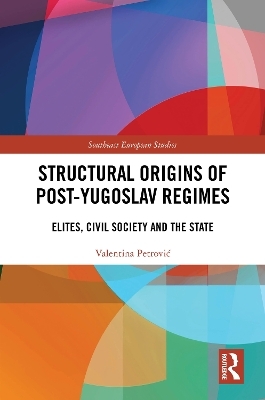
Structural Origins of Post-Yugoslav Regimes
Routledge (Verlag)
978-1-032-54553-0 (ISBN)
- Lieferbar (Termin unbekannt)
- Versandkostenfrei innerhalb Deutschlands
- Auch auf Rechnung
- Verfügbarkeit in der Filiale vor Ort prüfen
- Artikel merken
This analysis of the Yugoslav democratisation process explains the variation of regime outcomes within a structuralist framework. Focusing on the post‑socialist world, it goes beyond ethnicity and elite agency to bring the role of class and the state into discussions of third wave democracies. Offering an in‑depth study of four post‑Yugoslav cases and relying on extensive field work, it examines how civil society, state structures and elite agency influence the trajectories of Croatia, North Macedonia, Serbia and Slovenia after the end of socialism. The analysis also considers the impact of the European Union on domestic conditions. The author argues that no single factor explains the occurrence of democracy. It is instead the result of the combination of an autonomous civil society, a non‑captured state and ruling elites willing to implement democratic reforms. Concomitant with this, the analysis provides evidence that the only sufficient condition for the occurrence of democracy is non‑captured state structures. State capacity, therefore, plays a central role in democratisation. This book will be of interest to scholars and students of Eastern Europe, Southeastern Europe, the EU and democratisation, as well as to policymakers and nongovernmental organisations.
Valentina Petrović is a postdoctoral researcher in the Department of Sociology at the University of Zurich. She previously studied at the American University of Beirut, the University of Zurich and Sciences Po Bordeaux. She holds a doctoral degree from the European University Institute, Florence, Italy. Her dissertation examined the influence of classes, elites, civil society and state structures in the democratisation process in post‑communist countries, with a regional focus on the Yugoslav successor states. Her research interests include political sociology and comparative political economy, with a particular focus on the processes of democratisation, European integration and collective action in post‑communist context.
Introduction
Chapter 1: Unravelling Post-Yugoslav Transitions through Structural Realities and Elite Dynamics
Chapter 2: Regime Outcome in the 1990s: Democracy, Autocracy and Hybrid Regime
Chapter 3: Regime Outcome in the 2000s: Delayed Democracy, Authoritarian and Hybrid Regimes
Chapter 4: Illiberal trends after 2010 in the Post-Yugoslav Successor States
Chapter 5: Conclusion: Democratization Dynamics in Post-Socialist Europe
References
| Erscheinungsdatum | 22.08.2024 |
|---|---|
| Reihe/Serie | Southeast European Studies |
| Zusatzinfo | 25 Tables, black and white; 7 Line drawings, black and white; 7 Illustrations, black and white |
| Verlagsort | London |
| Sprache | englisch |
| Maße | 156 x 234 mm |
| Gewicht | 500 g |
| Themenwelt | Geisteswissenschaften ► Philosophie |
| Sozialwissenschaften ► Politik / Verwaltung ► Europäische / Internationale Politik | |
| Sozialwissenschaften ► Politik / Verwaltung ► Politische Systeme | |
| Sozialwissenschaften ► Politik / Verwaltung ► Politische Theorie | |
| Sozialwissenschaften ► Soziologie ► Spezielle Soziologien | |
| ISBN-10 | 1-032-54553-4 / 1032545534 |
| ISBN-13 | 978-1-032-54553-0 / 9781032545530 |
| Zustand | Neuware |
| Haben Sie eine Frage zum Produkt? |
aus dem Bereich


